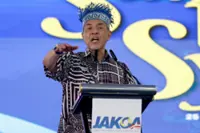
Zahari (right) meeting villagers in Desa Teluk Setimbul during the study tour to expose Johor’s Orang Asli to community development programmes in other regions.
THE Johor government will ensure that the Orang Asli community is not left behind as the state progresses towards achieving developed status by 2030.
Johor agriculture, agro-based industry and rural committee chairman Datuk Zahari Sarip pointed to the government’s continuous efforts to uplift the Orang Asli through various programmes.
“The state government will always prioritise the welfare of the Orang Asli community.
“We are committed to ensuring that they are not left behind in the state’s development efforts, and will continue to implement initiatives that enhance their quality of life,” he said in a statement.
Johor is currently home to 60 Orang Asli villages with five main ethnic groups – the Seletar, Kanaq, Jakun, Kuala and Temuan.
“The total population comprises 4,378 families, amounting to over 18,000 individuals,” he said.
The government, through the Department of Orang Asli Development (Jakoa), allocated RM7mil for 2024 and RM16mil for 2025, he added.
“These funds are directed towards economic and entrepreneurial programmes, housing aid, infrastructure development, road upgrades, treated water supply projects, human capital development, and cultural empowerment initiatives,” he explained.
In line with these efforts, the state government organised the Johor Orang Asli Community Leadership Programme 2025.
Led by Jakoa director Faisal Long, programme participants went on a study tour to an Indonesian Orang Asli village that had become self-reliant in many aspects.
Zahari said the village of Desa Teluk Setimbul in the Great Karimun Island in Riau province did not receive specific government assistance.
“We hope the experience and knowledge gained through this programme can be applied in the respective Johor Orang Asli villages,” he said.
Among the programme participants were Tok Batin (village chiefs), chairpersons of the Orang Asli Village Development and Security Committees, and youth representatives.
“The programme aimed to expose participants to successful community development initiatives in other regions,” Zahari said, adding that protecting the Orang Asli community was crucial to preserving Malaysia’s rich cultural heritage and biodiversity.
“Providing adequate resources, education, and healthcare allows them to thrive while maintaining their unique identity, and traditions.
“By investing in entrepreneurship and vocational training, the community can participate more actively in the modern economy while preserving their traditional crafts, and trades.
“This creates a more inclusive society and strengthens the overall economic resilience of the state,” he added.











































